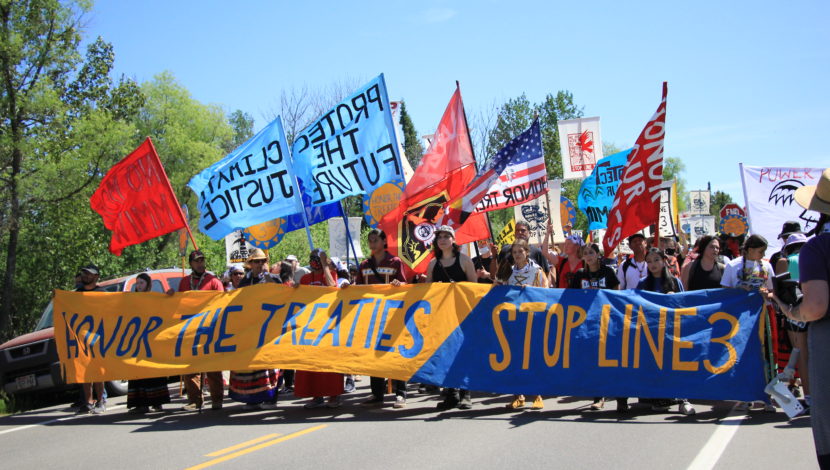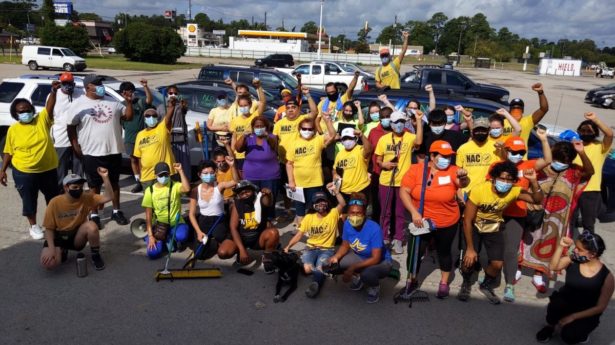The Unitarian Universalist Service Committee advances human rights through grassroots collaborations.
Biden Must Reverse His Stance on the Line 3 Pipeline

By on July 1, 2021
Throughout their time on the campaign trail and their months in office, the Biden administration has repeatedly pledged their commitment to environmental justice, climate justice, and the sovereignty and treaty rights of Indigenous people. So when the chance arrives to put a stop to an oil pipeline project that would transport hundreds of thousands of barrels of planet-warming fuel per day across Treaty-protected lands, the choice should be simple, right?
Apparently not. Recently, the Biden administration made the baffling decision to intervene in court in favor of the Line 3 project—a stretch of oil pipeline under construction in Minnesota that, if completed, would eventually have the capacity to transport more than a million barrels of tar sands oil every day. Billed as a “replacement” for an existing pipeline, the Line 3 project would in reality double the capacity of the current infrastructure and lead to vastly more emissions of greenhouse gases.
Even worse—the new Line 3 infrastructure would allow the company that owns the pipeline, Enbridge, to replace the flow of crude oil that currently runs through the pipeline with sludgy tar sands oil from Canada. This kind of fossil fuel is even more energy-intensive to produce and, if spilled, can lead to even longer-lasting environmental damages. This is not a hypothetical concern. Enbridge has been responsible for major spills in the past, including a 2010 incident that contaminated 30-35 miles of the Kalamazoo River.
The stretch of land through which this pipeline would run is protected under treaties the U.S. government swore to uphold. As the Supreme Court affirmed in a landmark 1999 decision, Indigenous peoples never ceded what are known as “usufructuary rights” to the territory covered in the planned pipeline route. The Anishinaabe people therefore still possess the sovereign right to hunt, fish, and gather wild rice and medicines on the land the pipeline would traverse. Construction of the pipeline severely endangers these rights.
Despite these grave concerns about the human and environmental impact of the project, the Biden administration’s Justice Department submitted a court filing on June 23 that backed Enbridge’s position. Misleadingly, the government’s brief characterizes Line 3 as a mere replacement of crumbling infrastructure that Enbridge is legally obliged to undertake. It also backs the Army Corps of Engineer’s erroneous contention that the project’s contribution to greenhouse gas output would be “negligible” on a global scale.
Neither argument is valid. Enbridge is not legally bound to substitute decaying infrastructure for new pipelines that would radically expand the amount of fuel they transport, while allowing for the movement of even more dangerous varieties of oil. Ultimately, this increased capacity from the completed project is estimated to lead to greenhouse gas emissions equivalent to 50 coal-fired plants, or the entire current emissions of the state of Minnesota.
This may not make Line 3 the only or the most important source of planetary emissions, but this is no excuse for inaction. The Line 3 pipeline matters very directly to the communities whose sovereignty, access to clean and safe water, and other human rights it would jeopardize. And if the Biden administration is not willing to intervene to stop this project on a smaller-scale, how will they undertake the broader economy-wide transformation that is needed to mitigate the effects of the climate crisis?
For these reasons, Indigenous leaders, activists, scholars, and everyone concerned about the violation of treaty rights and the integrity of the planet are calling on the Biden administration to reverse their position. President Biden has the authority to end the Line 3 pipeline if he should choose to do so. He canceled the permits needed to build the Keystone XL pipeline, and he could do the same for this no less harmful project. Hundreds of people have already taken direct action to urge him to do so, including UUSC staff and members. It’s time for Biden to heed that call.
The integrity of his word and the promises of the U.S. government are at stake. He must act now to uphold Treaty rights, protect the environment, and honor the obligations he undertook when he pledged to make his administration a champion of justice.
***
About UUSC: Guided by the belief that all people have inherent worth and dignity, UUSC advances human rights globally by partnering with affected communities who are confronting injustice, mobilizing to challenge oppressive systems, and inspiring and sustaining spiritually grounded activism for justice. We invite you to join us in this journey toward realizing a better future!
Image Credit: Treaty People Gathering

